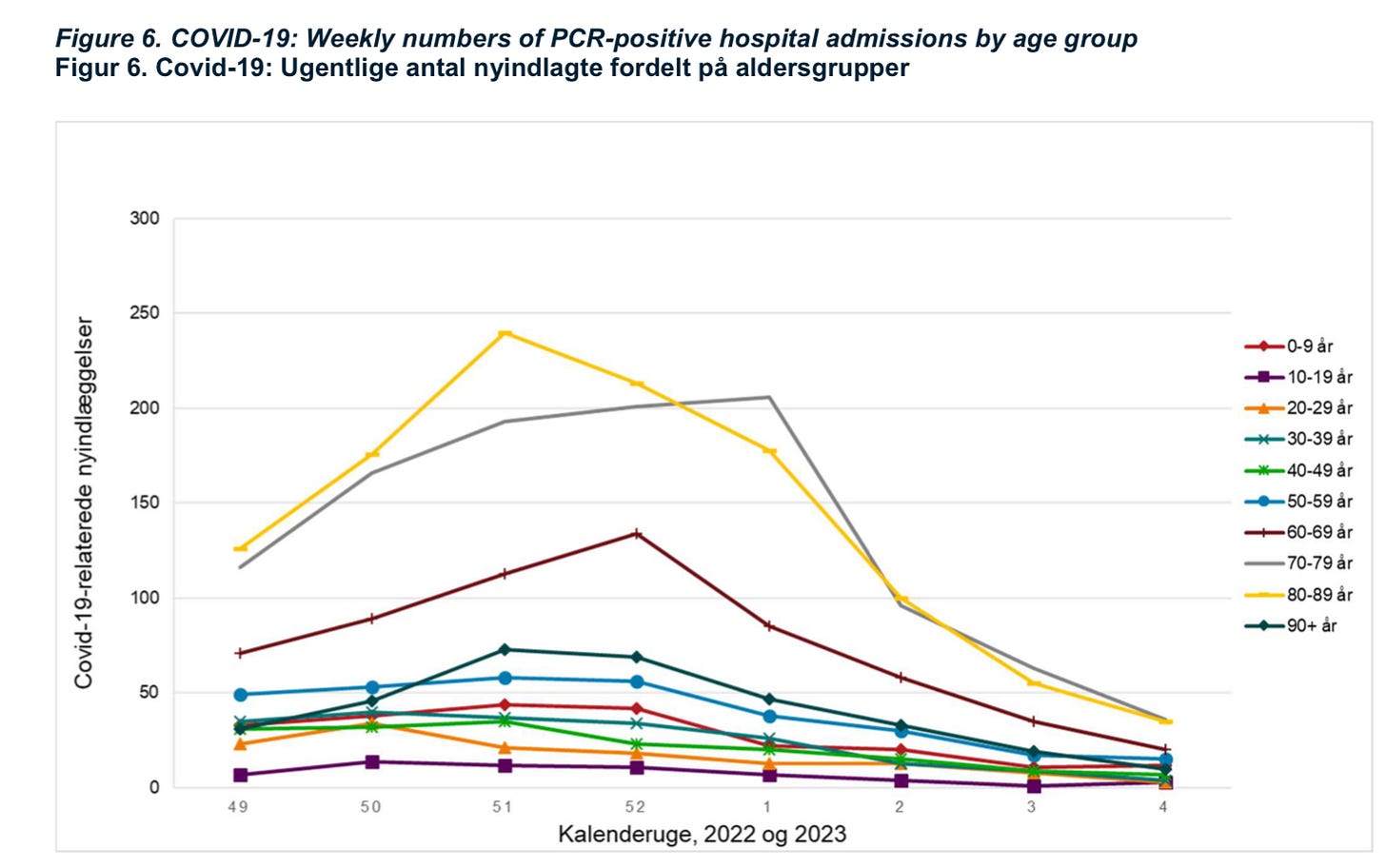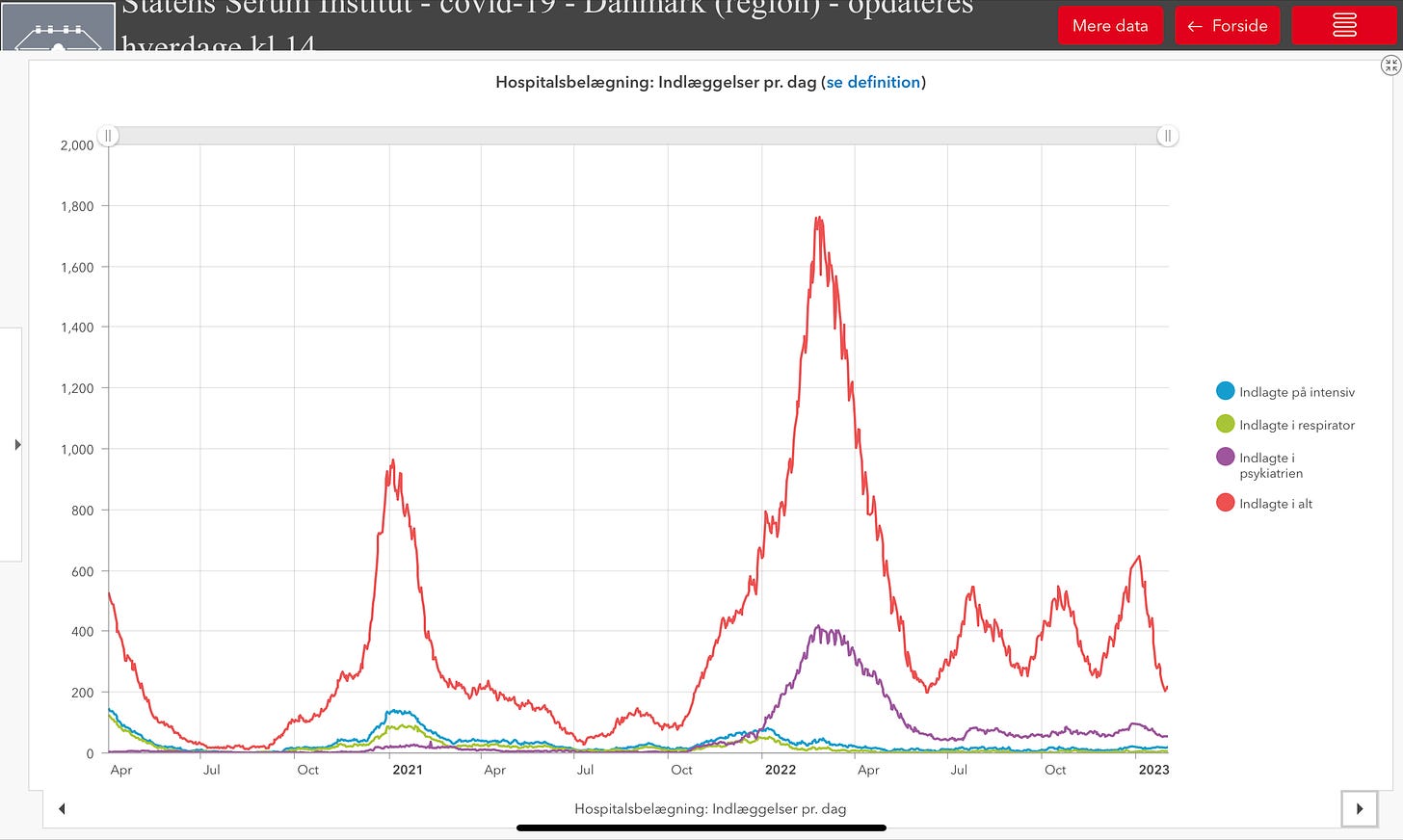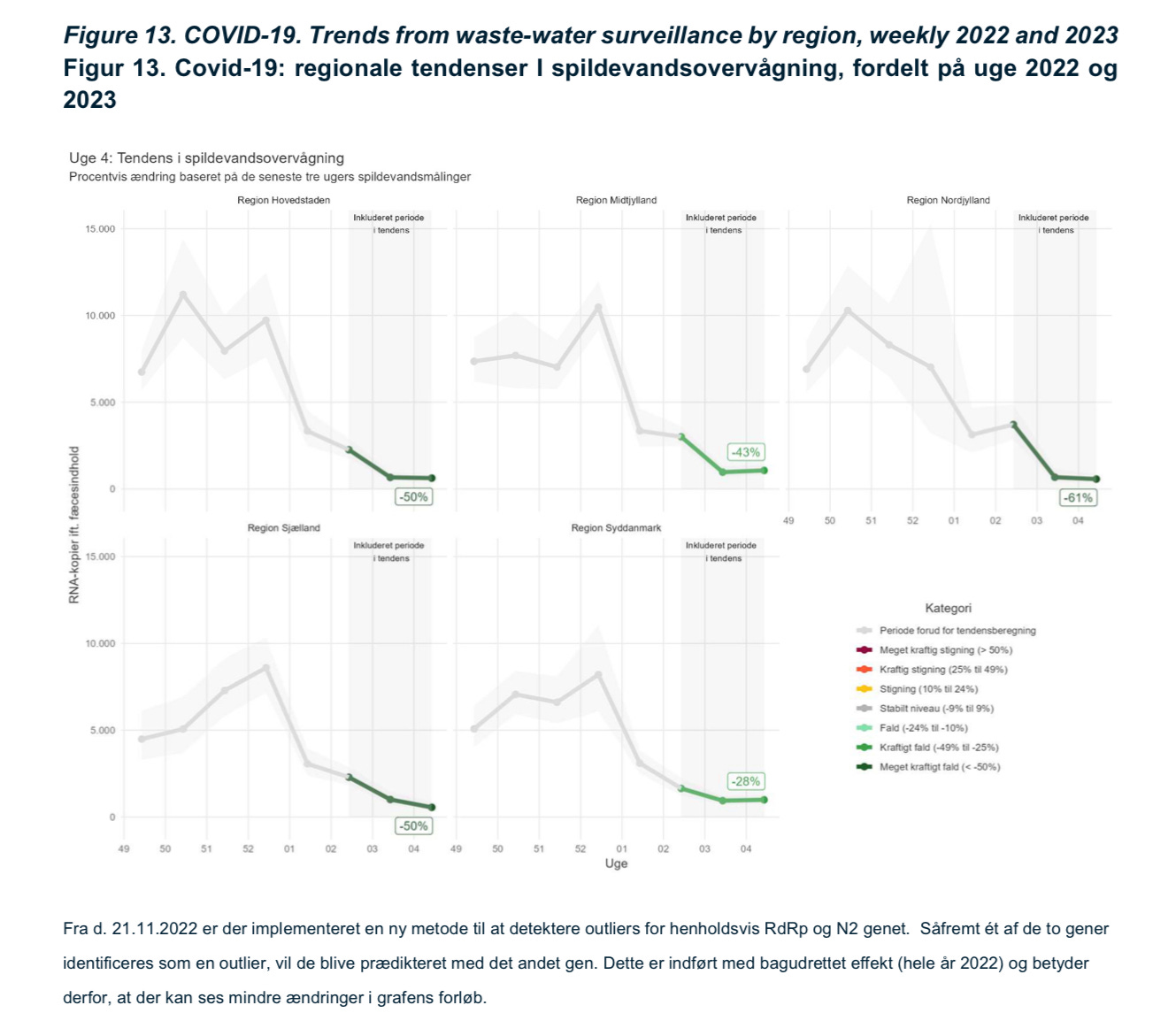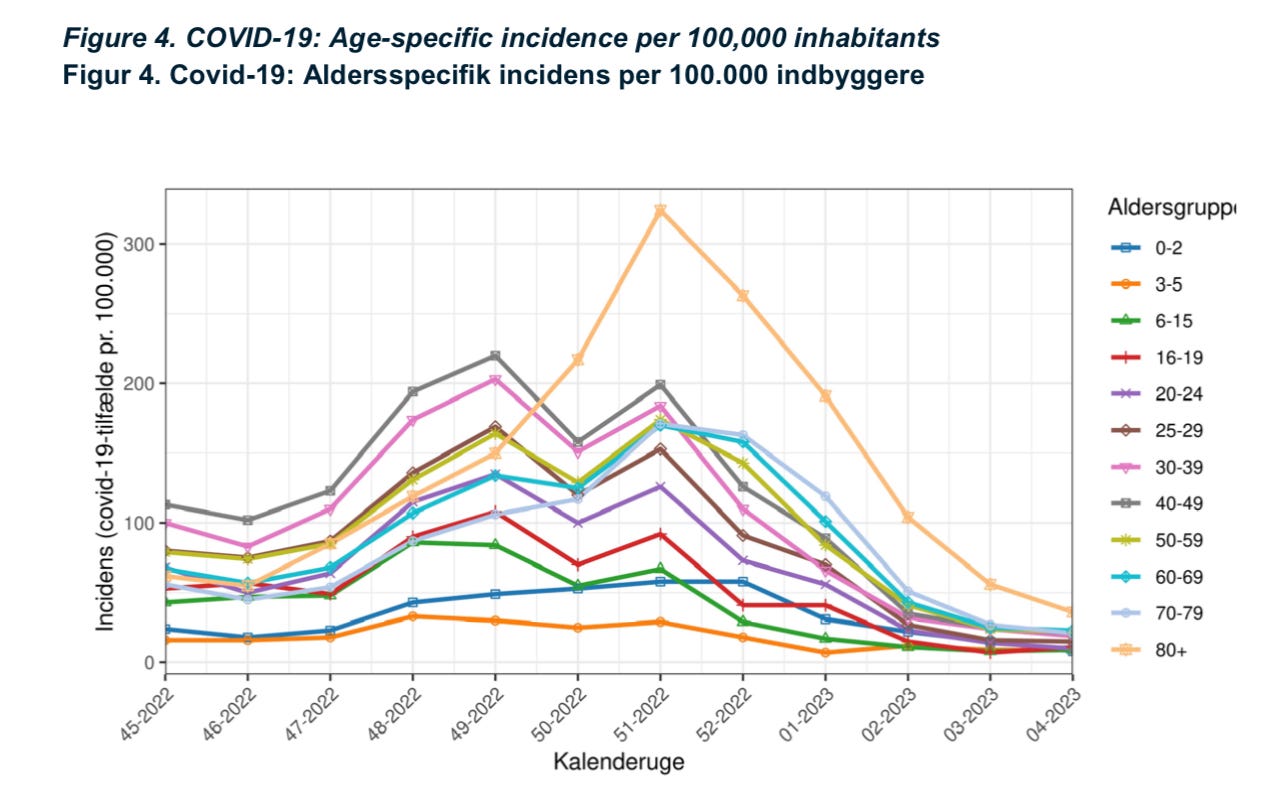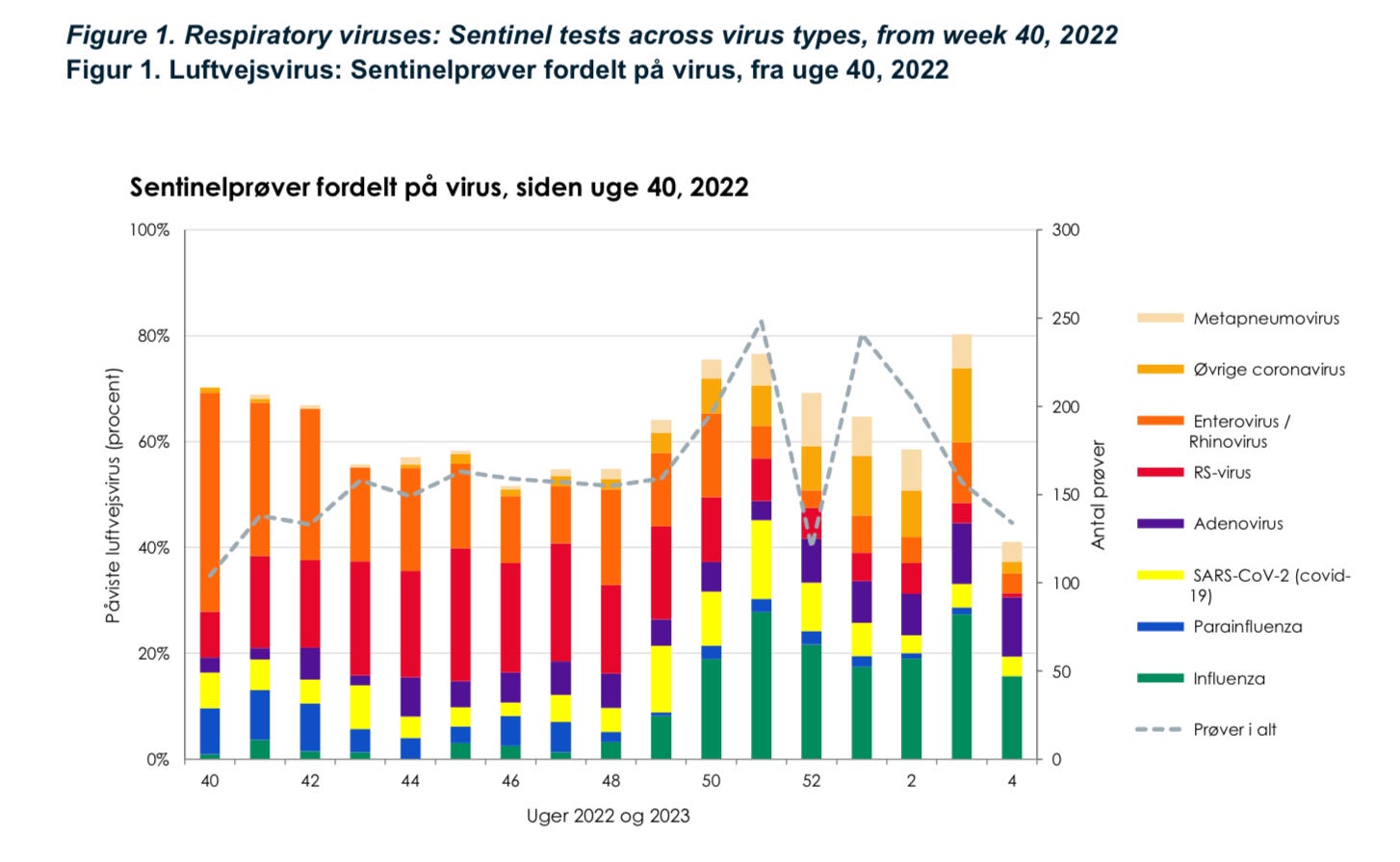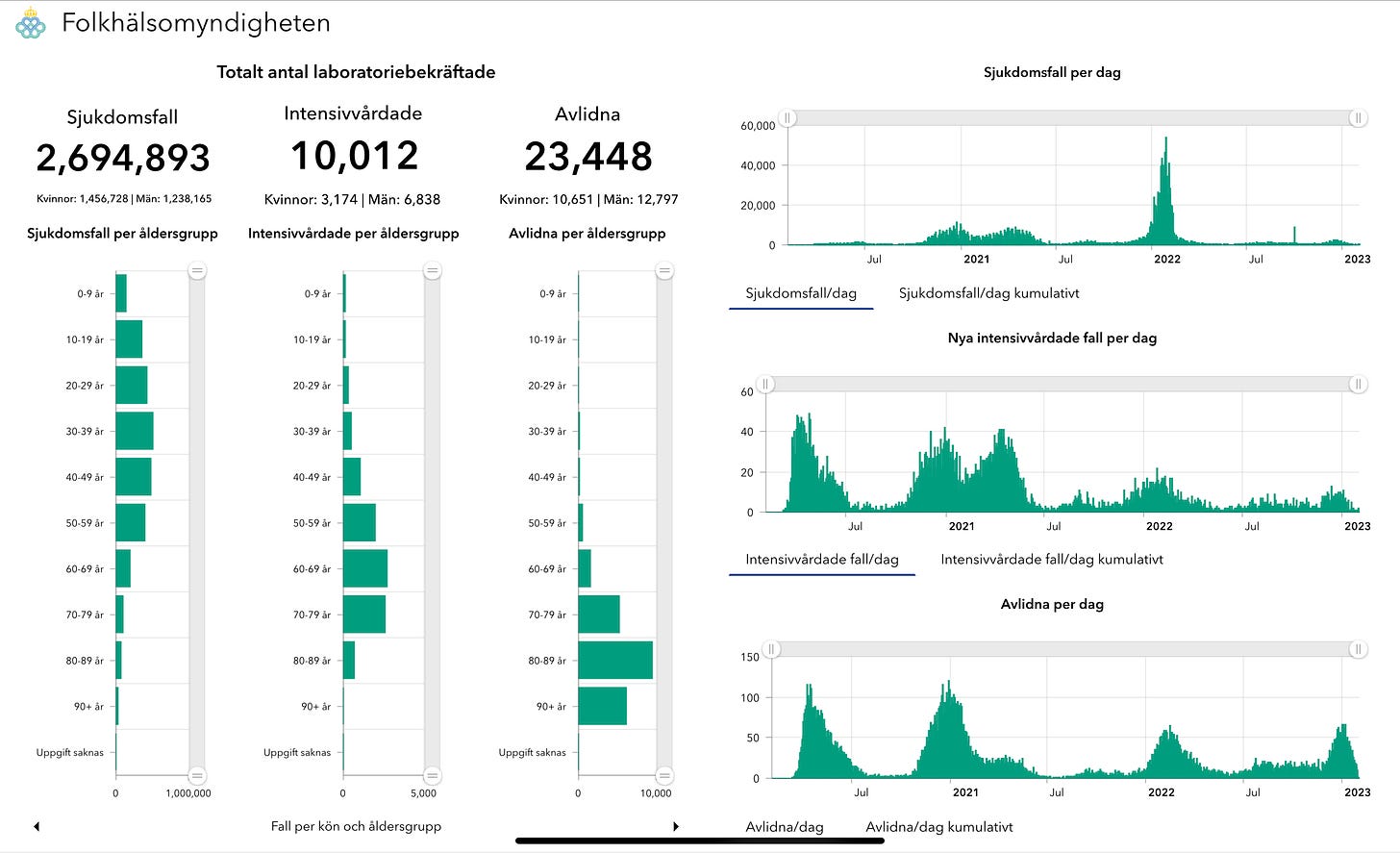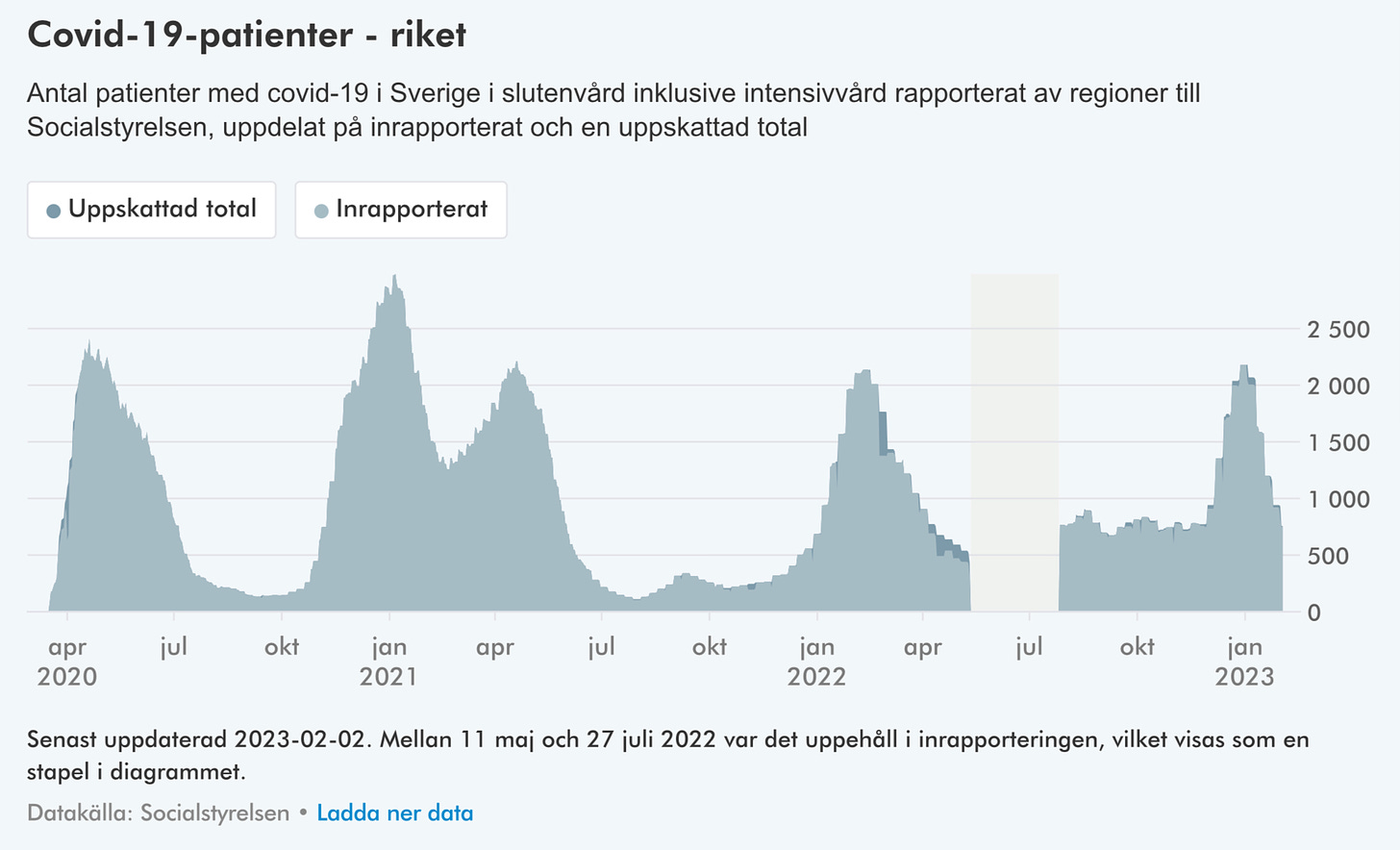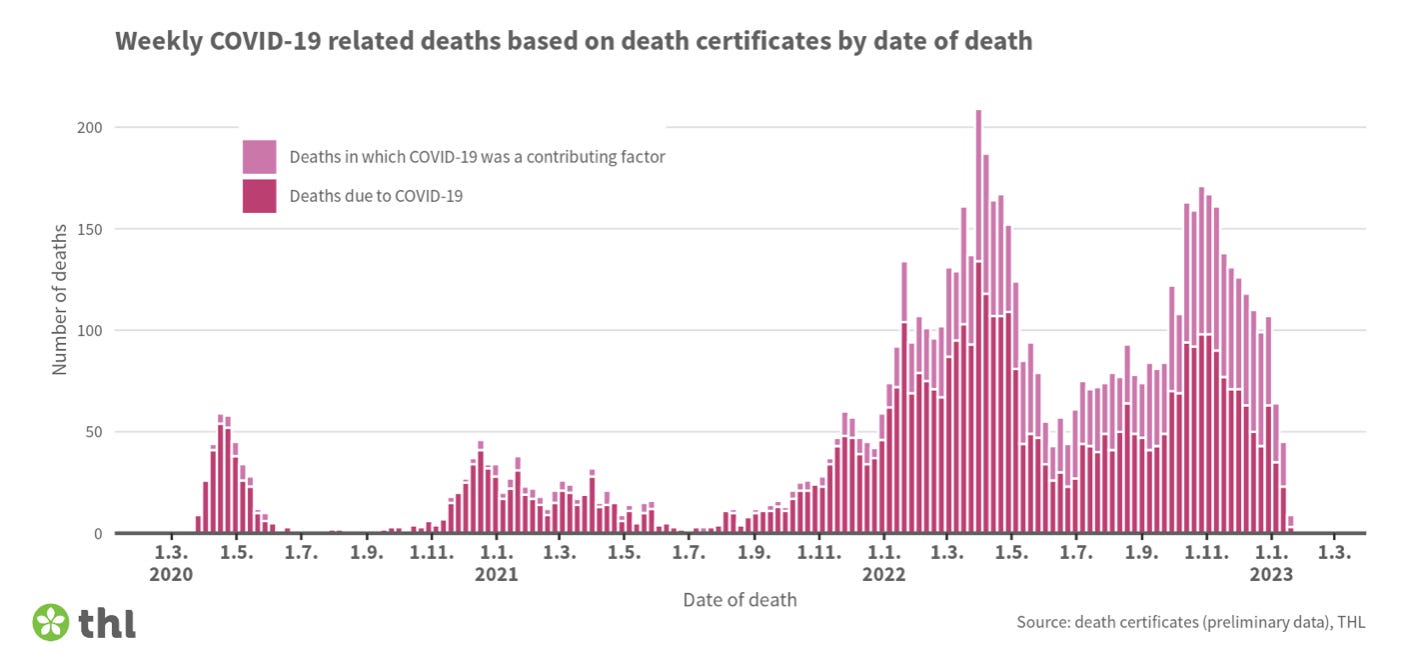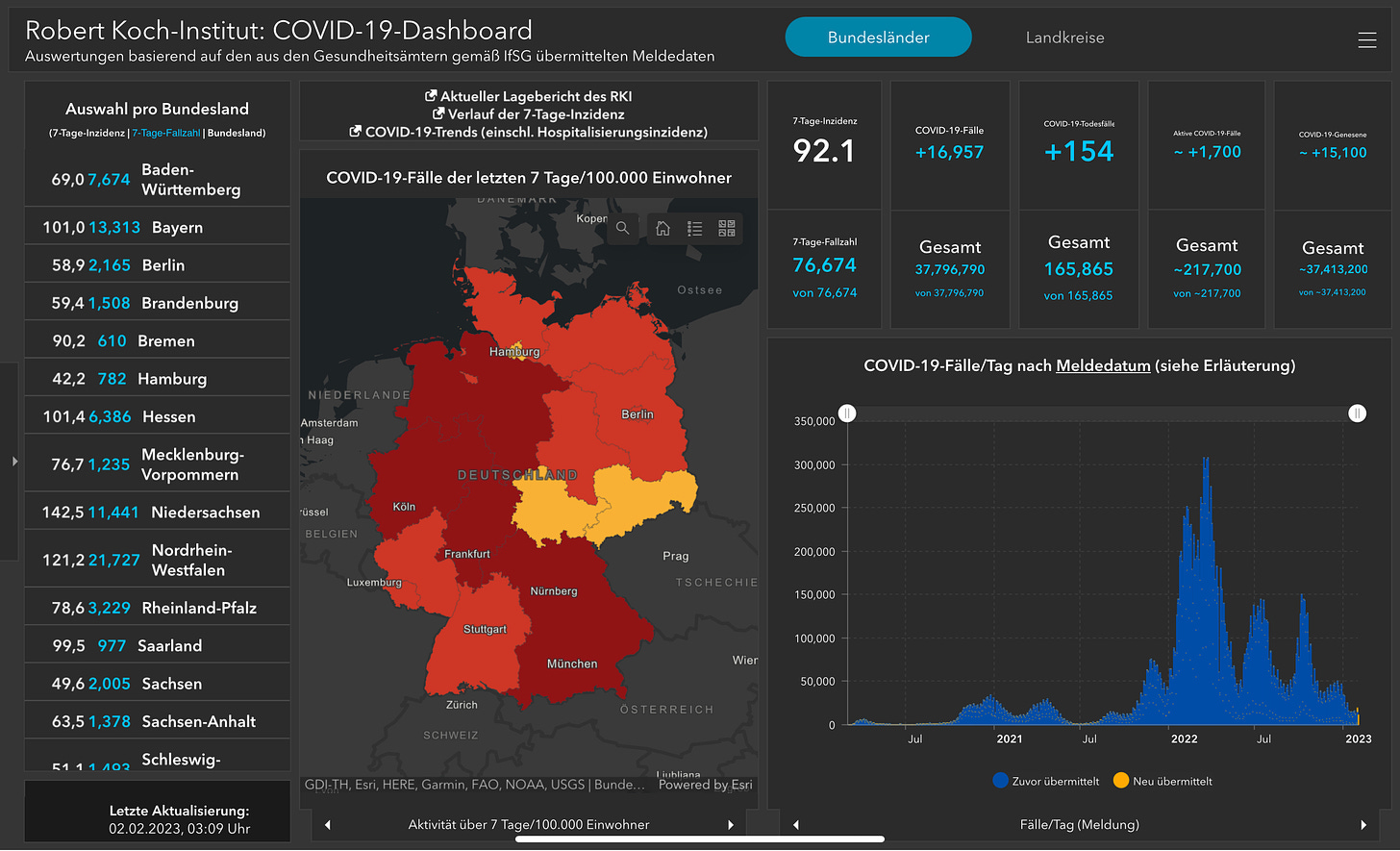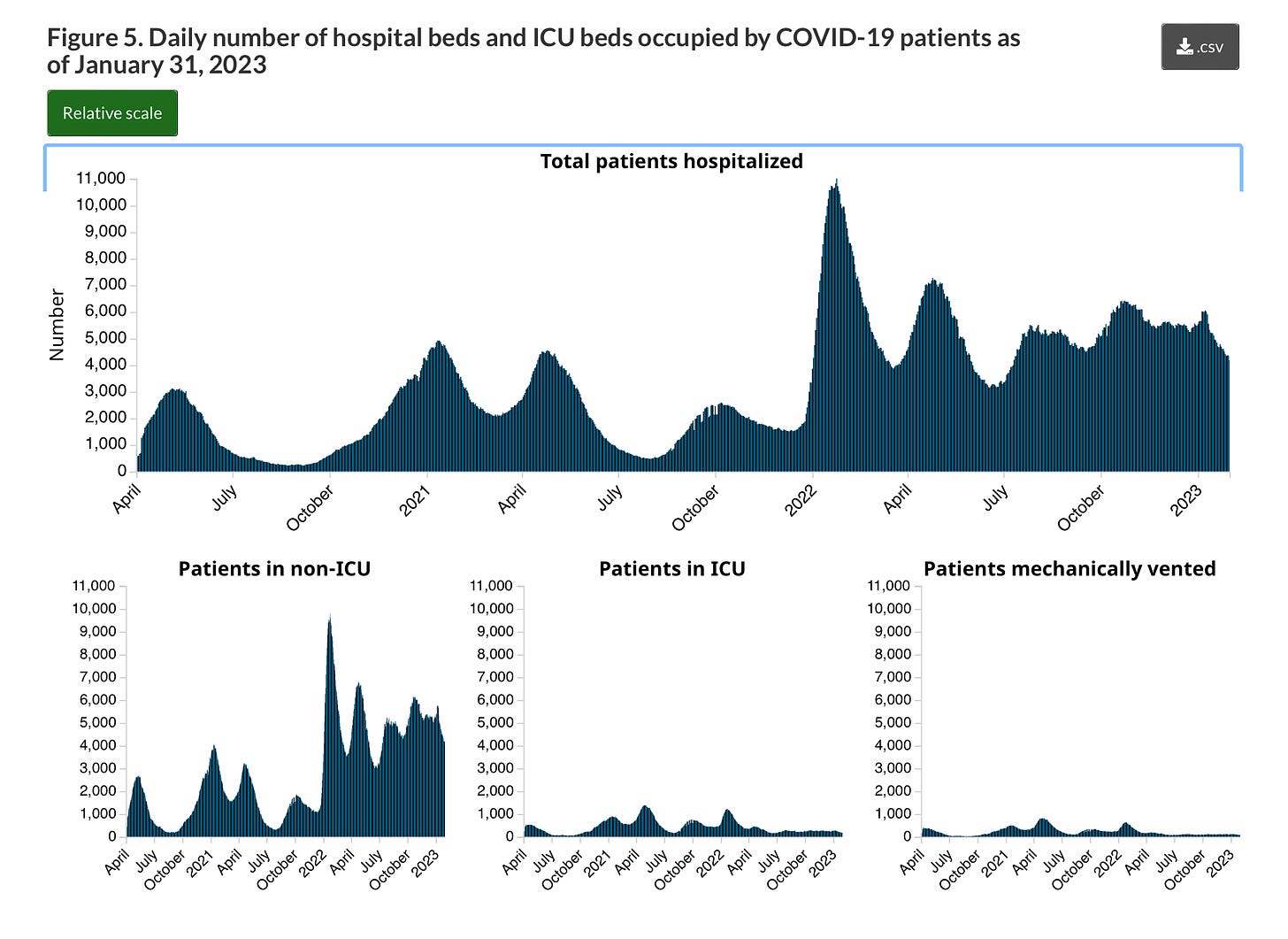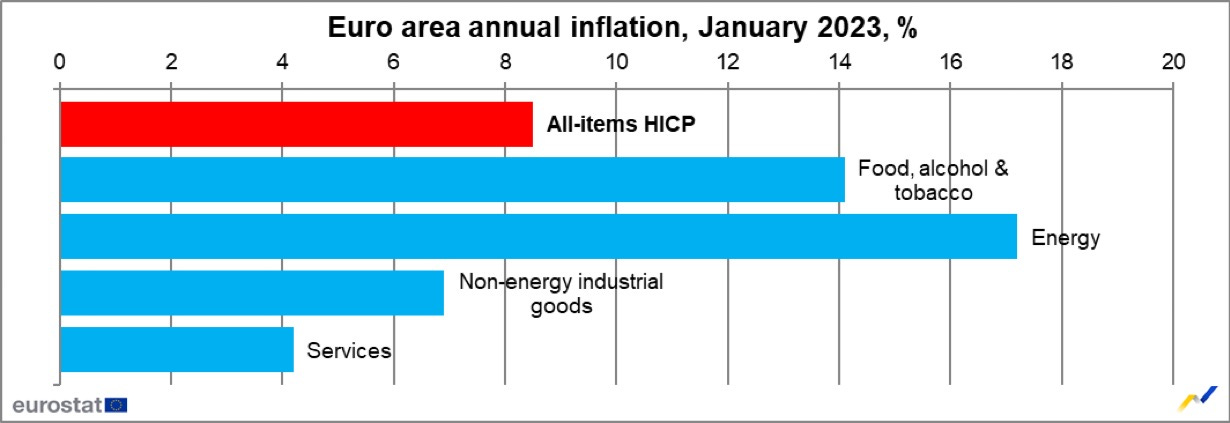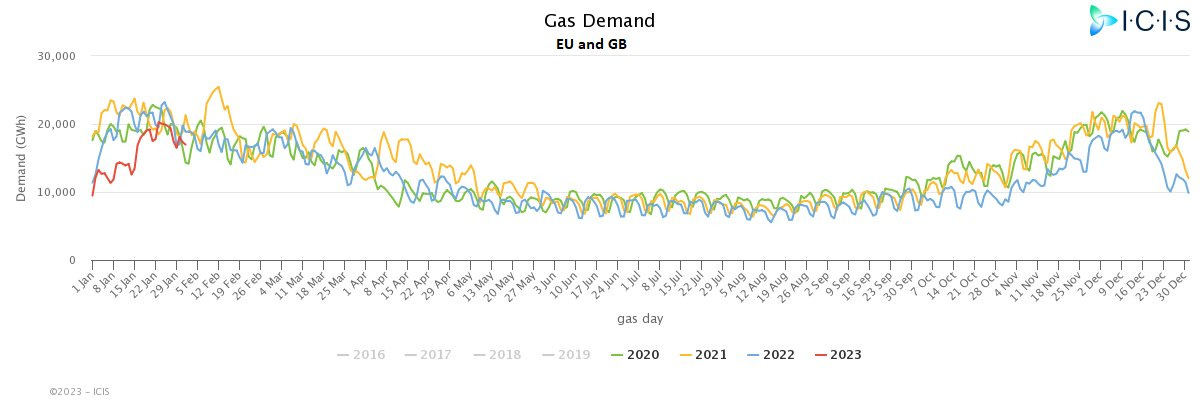🦠Pandemic🦠
🇩🇰
There won’t be third round of COVID vaccine booster doses, at least not until later this year. The Danish National Health Authority has ruled out giving a third booster dose to seniors and other vulnerable populations in the months ahead.
In its decision the agency cites plummeting coronavirus numbers, a very high vaccination rate, and studies showing strong protections from a second booster dose that endure for three or four months.
Chief Physician Kirstine Moll Harboe:
“We have the highest vaccination adherence in Europe, and the vaccines have proven to be very effective, also for the very oldest and most vulnerable. We are in a good place in the COVID epidemic. We can only be happy about that.”
Since the second booster dose campaign began last September, the health authority says 92% of seniors in care have a 4th dose, as have 91% of seniors over the age of 85. Among the target group of people 50 years old and older, vaccination uptake is 79%.
Data from Danish health agencies, like the Statens Serum Institute, have found that a 2nd booster dose offers 74% higher protection against a severe infection resulting in hospitalization.
But, while the national health authority has ruled out another booster dose campaign for the immediate future, it says that planning will begin this summer for another round of booster shots to come this fall.
-
Denmark is further scaling back its pandemic response this year and then to a “new basic level” beginning next year.
Legislation governing Denmark’s current COVID response will expire in the first quarter of this year. The Danish Health Ministry says due to falling coronavirus numbers and professional assessments from health authorities, that response efforts need to be scaled back, in part to reduce costs.
Health Minister Sophie Løhde:
“The health assessment is completely clear. Therefore, it is time to find a new basic level for the COVID effort here at home. The health authorities will now begin to scale back the efforts so that there will continue to be sufficient preparedness.”
The scaling back won’t impact the vaccination program, which will continue to work to protect vulnerable and high-risk populations, but it does mean Denmark’s once vaunted public PCR testing program will be “phased out.” The ministry says that health authorities will continue to monitor infectious diseases, just not as much as the all-hands-on-deck pandemic approach, but “to a greater extent than in 2019.”
-
COVID numbers continue to plummet in Denmark, according to the latest weekly pandemic update from the Statens Serum Institute.
COVID hospitalizations continue to drop, with 145 new admissions last week, 82 fewer than there was the week before. As has been the case for many months, although overall numbers are declining, seniors 70 to 89 years old continue to make up the largest group of new admissions.
Thursday’s daily report is delayed due to technical issues, as of Wednesday, daily hospitalizations (211 had dipped (-7) and the number of severe infections in an ICU (19) was unchanged day to day, and of those, the number on a ventilator (7) crept upward (+1).
Infection-related admissions to a psychiatric facility (53) are down (-2)
-
There were 38 more coronavirus deaths in Denmark last week, down from the 74 lives lost the previous week. The SSI notes excess mortality remains elevated but is dropping. Elderly seniors over the age of 85 continue to see the highest death rate.
-
Wastewater surveillance shows that virus activity continues to fall nationally. However, the rate of decline has slowed since the beginning of the year. There are also some variations between the five Danish regions. Sharp decreases are seen in Region Hovedstaden (Metro Copenhagen), North Jutland and Sjælland. While Region Midtjylland and Region Syddanmark also saw decreasing virus activity but to a lesser degree.
-
As for the less reliable indicators, the COVID incidence rate slid from 22 cases per 100,000 people to 18 from one week to the next. The positivity percentage also dropped slightly, going from 7.2% to 6.9%. But, PCR testing rates also fell by another 13% last week, making case counts even more unreliable.
The highest COVID incidence rate (36 per 100,000 people) is among seniors over the age of 80. At the same time, the highest positivity percentage was among 16 to 19 year-olds.
Among ulnerable seniors in care, one of the country’s most tested populations although even there testing rates are dropping, infection numbers were fairly stable, with 79 cases last week versus 83 the week before. Nineteen more lives were lost among senior home residents last week, the same as the week prior.
-
With dropping testing numbers equating to fewer sequencing being done, it is getting harder to get a firm handle on the variant situation in Denmark. Based on the information available, BQ.1.1 holds a slim dominance, but the BA.2.75 variant continues to see steady growth, making up 30.64% of all sequenced positive test results. The Statens Serum Institute also notes that a newer variant, CH.1.1 is also growing as it came back in 15% of infections last week. The XBB.1.5 variant also saw a bit of an increase week to week (9%).
-
According to the Statens Serum Institute’s sentinel monitoring overall respiratory infection activity has increased. Influenza was the most frequently detected virus in the country. The SSI says what were declining post-Christmas flu rates have now reversed, and it is seeing rising numbers of both A and B strain influenza activity. Influenza A-related hospital admissions are also increasing due to that strain having a heavier impact on seniors.
The institute says RS virus cases and new hospital admissions continue to drop.
🇸🇪
Sweden has added 1,435 new infections (wildly underreported) and suffered another 169 corona deaths in the last seven days.
COVID hospitalizations (750) continue to drop (-171).
Vaccination stats haven’t been updated this week.
🇳🇴
The COVID wave is over according to the Norwegian Institute of Public Health in its latest weekly update. After being buffeted by sImultaneous COVID, influenza, and RS virus waves, Norway is in a much better place now than it was just a few weeks ago.
The NIPH says it has seen a significant decrease in respiratory infections and new hospital admissions in the first three weeks of the year. But, there are still some potentially concerning trends.
Overall, respiratory infections have declined sharply, as have related visits to an emergency room or family doctor. But, the institute notes declines have leveled off over the last week. Respiratory infection-related hospitalizations peaked in the last week of 2022 with 2,991 admissions. Three weeks into January, those numbers have dropped to 1,230, or roughly in the same neighbourhood as any pre-pandemic flu season.
Looking at the three dominant viruses.
The RS virus seems to be of the most concern at the moment. While infection numbers have been stable in the previous week, hospitalizations have increased slightly, with 189 admissions last week, two more than the week before. The lion’s share of hospitalizations are children under the age of four, where the virus positivity percentage was a whopping 40.4% last week. The institute says RS virus developments are still “uncertain.”
Influenza numbers dropped sharply in Norway in the first three weeks of the year. But the national health agency says infection declines have leveled off in the last week and, in fact, may have increased slightly. It also notes the influenza situation varies from region to region across the country. The regions of Agder and Rogaland are still struggling with a lot of influenza activity, while infection waves appear to be ending in Troms and Finnmark. The flu positivity percentage in Norway last week was 14%, a slight week-over-week increase. Hospitalizations have also risen, with 232 admissions, 27 more than the previous week.
The NIPH says it is unclear if influenza activity is picking up again or not.
Influenza vaccination rates continue to leave much to be desired. 63% of seniors over 65 have a flu shot. Just 34% of those in high-risk groups 18 to 64 years old are vaccinated. Vaccination coverage among healthcare workers is 38%. And a pathetic 7.3% of children under 17 have a flu shot.
The NIPH says by virtually every indicator, the latest coronavirus wave is over. Wastewater surveillance, positivity percentage, doctor and emergency room visits, severe infection cases, and hospital outbreaks all show steady declines. There were 57 COVID hospitalizations last week, 20 fewer than the week prior. ICU admissions have fallen from nine to three from week to week. The institute says there was also a “clear decrease” in pandemic deaths, with 24 lives lost last week, down from 47 the week before.
The BQ.1.1 variant is dominant in Norway. But, BA.2.75 is on the rise.
🇫🇮
Finland recorded another 579 infections and 100 more virus deaths in the last week.
🇩🇪
Germany registered 16,957 new infections while suffering 154 more pandemic deaths in its Thursday update.
It added 1,307 hospitalizations while ICU numbers (600) inched upward (+1).as a percentage of all intensive care beds in the country, severe infection cases are using 2.8%.
-
Effective February 2 (today), the requirement to wear a mask on all long-distance trains in Germany has been rescinded.
However, German Health Minister Karl Lauterbach says this doesn’t mean you shouldn’t mask up.
“Nevertheless, you should voluntarily wear a mask. I do too. In order not to risk Long-COVID and to protect others.”
-
The German state of Hessen, has also lifted mask requirement on all public transport as of today (February 2). State Social Affairs Minister Kai Klose says rules requiring mask use in hospitals, senior care homes, and other medical facilities will remain in place.
🇪🇸
After the COVID pandemic knee capped international tourism for two years, visitors are now returning to Spain.
Spanish Tourism Minister Reyes Maroto told Reuters that Spain saw over 71 million tourists last year, a hefty increase from the 31 million visits recorded in 2021 when travel restrictions began to be eased.
“It is still lower than the record in 2019 (over 83 million), but the tourists have stayed longer and spent more money than they did then.”
She says the average tourism stay in 2022 was almost eight days.
🇨🇦
COVID hospitalizations fell across Canada. In the week ending January 31, the total number of hospital beds in use by a coronavirus patient fell to 4,191, which is 427 fewer than the week before. Most of the declines were in pandemic-related general admissions, as they dropped from 4,412 to 4,008 from one week to the next. Intensive care beds in use dropped by 13 to 183. At the same time, the number of severely infected people on a ventilator declined to 86, a week-to-week drop of nine.
⚡️Energy Crisis⚡️
🇪🇺
Eurozone inflation is expected to keep easing as the European Union statistics agency, EuroStat, releases a first look at January’s numbers. Its “flash estimate” has inflation decreasing from 9.2% in December to an estimated 8.5% in January. This would be the third straight month of declining inflation in Europe. As has been the trend for several months now, the energy crisis has been a big inflation driver, followed by food, alcohol, and tobacco.
While still very high, the inflation rate for energy looks to have also let up a little, falling from 25.5% in December down to 17.2% last month. But, the rate for food, alcohol, and tobacco actually inched upward month to month, going from 13.8% to 14.1%.
-
Preliminary numbers from the Independent Commodity Intelligence Services indicate that natural gas demand across the European Union last month was 24% below the five-year average (2017 to 2021).
Looking at specific countries, Germany recorded 22% less natural gas use, Italy 25%, France 18%, the Netherlands 33%, Spain 23%, and Britain 21%.
🇩🇰
There is a high risk of cyber attacks aimed at the Danish energy sector. That is the assessment of the Center for Cyber Security says in particular, the risk of ransomware attacks is of the most concern.
“With the technological development, the fear of hackers hitting companies' operational technology will put even more pressure on the victims of ransomware.”
CFCS Denmark says the cyber espionage threat mainly comes from state-sponsored hackers in Russia and China, which it says both have the “capacity and intention” to engage in malicious cyber-warfare.
Earlier this week, the CFCS raised Denmark’s overall cyber attack threat level from medium to high.
🇺🇦/ 🇷🇺 War
🇫🇮 🇸🇪/ 🇹🇷
Finnish Prime Minister Sanna Marin was in Stockholm on Thursday, and met with Swedish Prime Minister Ulf Kristersson. One of the topics on the table was the NATO application process the two countries are going through. After the meeting Marin didn’t mince words.
“I think it is very important that we send a clear message today that Finland and Sweden applied for NATO together, and it is in everyone's interest that we join NATO together.”
Marin also took direct aim at accusations flying out of Turkey.
“I don't like that Sweden is considered a troublemaker in this situation. Both Finland and Sweden meet the criteria for NATO membership.”

28 out of the 30 NATO member countries have delivered lightning fast ratification votes approving Finland and Swedens applications. Of the two countries left, Hungary continues to drag its feet while Turkey blusters and threatens to block Sweden from joining NATO.
🇸🇪/ 🇹🇷
“Useful idiots” that is how Sweden’s Prime Minister describes right-wing extremists that hung an effigy of Turkish President Recep Tayyip Erdogan and staged a burning of the Muslim holy book, the Quran. Ulf Kristersson says the activists were pawns of “foreign powers,”which he didn’t name directly, who seek to damage Sweden’s chances of joining NATO.
“We have seen how foreign actors, even state actors, have used these manifestations to inflame the situation in a way that is directly harmful to Swedish security. The groups and individuals who carried out this kind of action, in this security situation, they become useful idiots for forces that wish harm upon Sweden.”
Kristersson says back-channel diplomatic efforts are ongoing to try and cool temperatures with Turkey. Engaged in a national election battle Turkish President Erdogan has relished making political hay over the incidents, directly threatening to block Sweden’s NATO application.
🇳🇴 🇺🇦
Norway’s TV2 is reporting that Norwegian CV90 armoured vehicles could be donated to Ukraine. It says the Ministry of Defense has asked staff to look into CV90 inventories to see how many of the armoured vehicles could be donated.
Defense Minister Bjørn Gram spoke to TV2:
“The government continuously considers whether Norway should send more weapons/material to Ukraine. We do not comment on these assessments and any ongoing or future contributions. We have a good dialogue with Ukraine and allies about the needs. We will support Ukraine as long as necessary.”
Norway will also reportedly donate as many as eight Leopard tanks to Ukraine.
🇩🇰 🇺🇦
An independent journalism publication focusing on the Danish defense and security sectors, OLFI, is reporting that Denmark might purchase 20 decommissioned Leopard 1A5 tanks, have them refurbished, and then send them to Ukraine. The tanks were in service in the Danish Armed Forces until 2010. The tanks are currently in possession of a German company that bought them from Denmark when they were decommissioned.
🇪🇺/ 🇷🇺
Russia will pay an even heavier price for its invasion of Ukraine. That is what European Union Commission President Ursula von der Leyen said on Thursday, as she revealed the EU will soon table another round of sanctions against Russia.
“We are making Putin pay for his atrocious war. And he will have to pay for the reconstruction of Ukraine. We aim to have the 10th package of sanctions in place by February 24.”
She says existing sanctions continue to erode Russia’s economy “throwing it back by a generation.” In its last sanctions package, the EU placed a cap on Russian oil. It will soon do the same for all Russian petroleum products. And, von der Leyen says, all options are being looked at to see how Russian assets can be seized across Europe, assets that will then be used to help pay to rebuild Ukraine.
🇪🇺 🇺🇦
The European Union is planning to double the scope of its military training mission for Ukrainian soldiers. The EU has already run 15,000 soldiers through its training program and now wants to be able to take in another 15,000 Ukrainian soldiers for a second phase.
🇱🇻/ IOC 🇷🇺 🇧🇾
As the International Olympic Committee opens the door to allowing athletes from Belarus and Russia to compete in the 2024 games in Paris, the reaction from Latvia has been swift. The Latvian National Olympic Committee has released a statement basically saying if Russian athletes are allowed to compete, then Latvian athletes will be staying home.
“For as long as there is an ongoing war in Ukraine, participation of the Russian and Belarusian athletes in the Olympic Games under any flag is unacceptable.”
Further, it adds:
“Any action aimed at returning the Russian and Belarusian athletes and sports representatives to international sports arenas, in the framework of competitions or otherwise, under their national flag or any other symbol, is encouragement for further escalation of warfare, and the normalization of war crimes and brutal violence.”
Both Ukraine and Poland have also threatened to boycott the games if Russian athletes are allowed to compete.
🇦🇹
After joining Hungary in agreeing not to send any weapons to Ukraine out of fears of provoking Russia, Austria has expelled four Russian diplomats, including two who were accredited with the United Nations in Vienna.
Austria’s Foreign Affairs Ministry says the four diplomats are alleged to have acted "in a manner incompatible with their diplomatic status."
🇩🇰/ 🇺🇦
Sad news, a lioness named Vee, one of three evacuated from Ukraine that found a home in Denmark’s Knuthenborg Safaripark, had to be euthanized. In a Facebook post, the park says that Vee had a back deformity and despite consultations with veterinarians and even an orthopedic surgeon, it was determined nothing could be done.
Park Veterinarian Therese Hård says they had to make the difficult choice to euthanize Vee.
“It is our responsibility when we have these animals, also to say stop when they have no prospect of a good life.”
The three lionesses were evacuated from Feldman Ecopark, in the Donetsk region of Ukraine where there has been some of the heaviest fighting.




